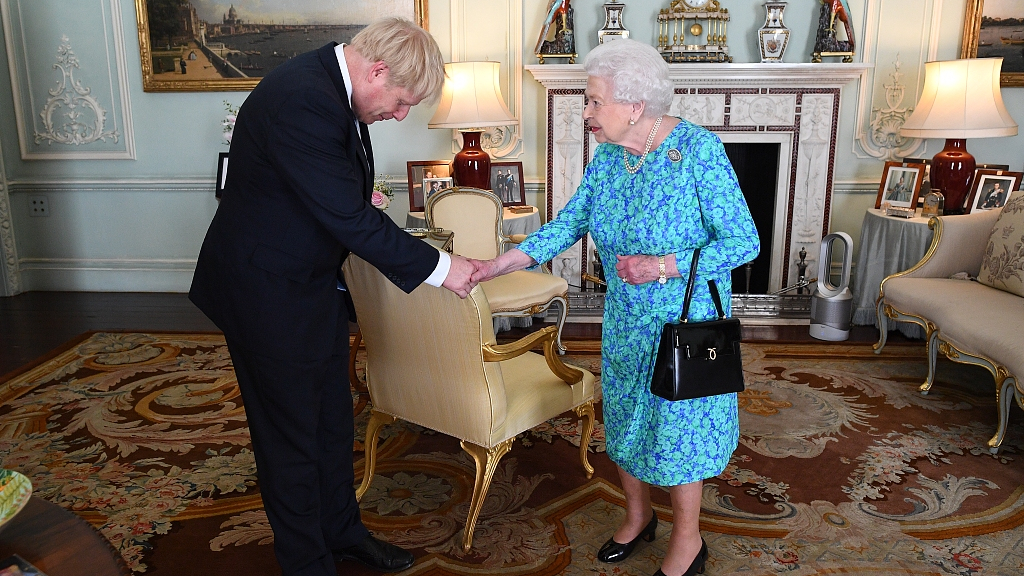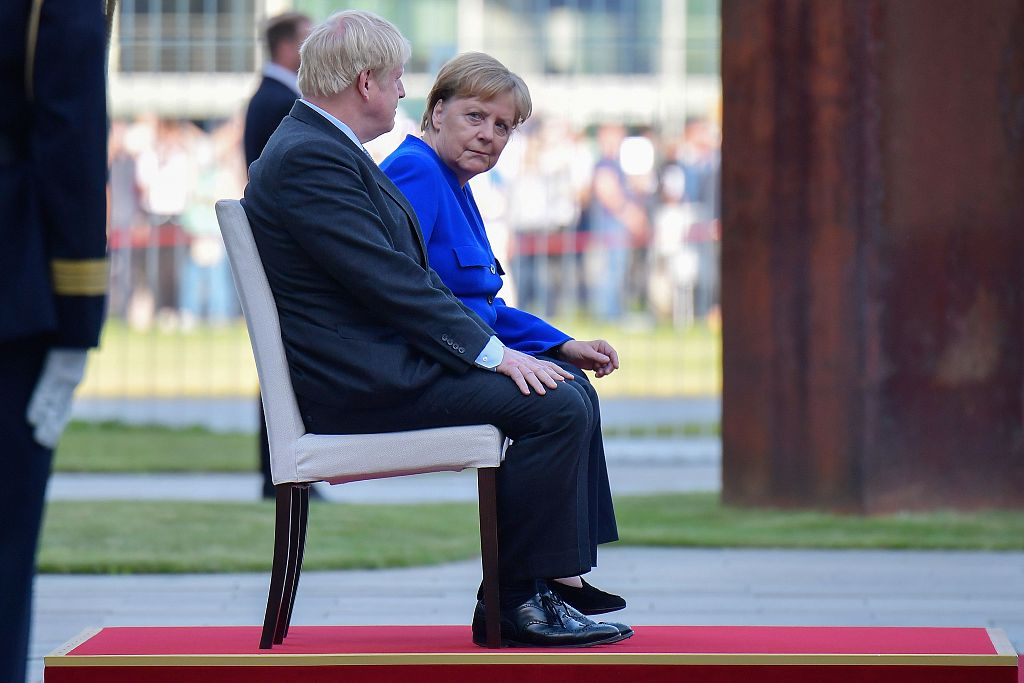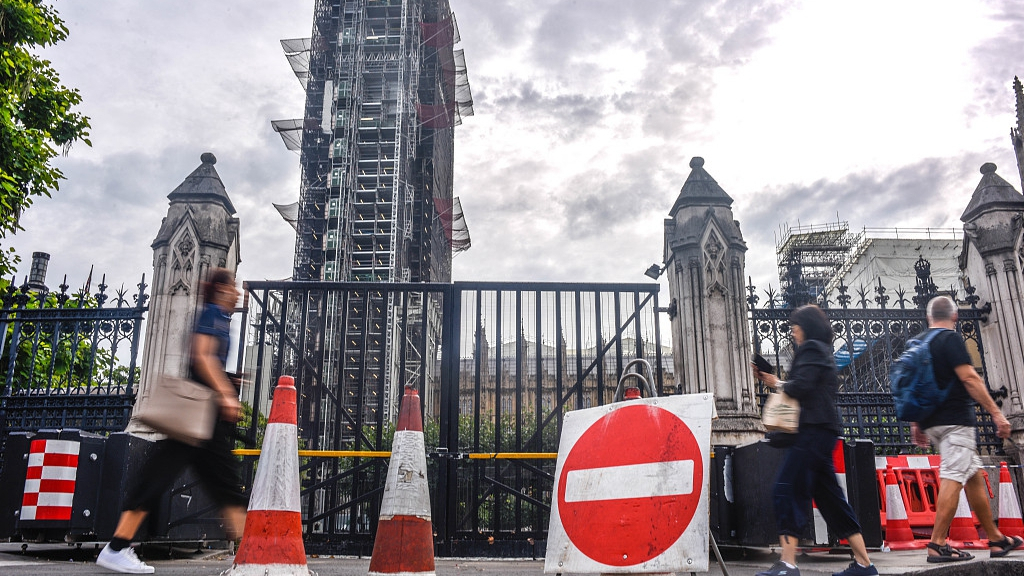

Editor's note: Chris Deacon is a postgraduate researcher in politics and international relations at the University of London and previously worked as an international commercial lawyer. The article reflects the author's views, and not necessarily those of CGTN.
The UK government, under Prime Minister Boris Johnson, confirmed on August 28 afternoon that Parliament will be suspended in roughly two weeks’ time until October 14. During this crucial run-up to the Brexit deadline on October 31, Members of Parliament (MPs) would not be able to take any action to avert a no-deal Brexit, as they would not be sitting.
This so-called “prorogation” of Parliament is very common; it acts to break up sessions of Parliament, the new session being started by the holding of a “Queen’s Speech” in which the government puts forward its priorities for the new session. It is particularly common for this to happen when a new Prime Minister is installed without an election, as has happened recently in the UK.
Then why is this move of such importance? Although Johnson is explicitly denying it, it seems very clear that the point of this prorogation is to deny MPs the opportunity to attempt to block a no-deal Brexit, particularly through legislating for an extension to the Article 50 process – or, at least, to make this much more difficult.
In this sense, the move is profoundly undemocratic because it is seeking to deny a say to the democratically elected representatives of the British people, regarding a decision of profound importance to the future of the UK.
This is reinforced yet further when we consider that, while Brexit was voted for by a majority of Brits, a no-deal Brexit specifically has no democratic mandate. On the contrary, during the 2016 referendum campaign, in virtually all documented cases, those arguing for leaving the European Union claimed this would occur with a deal.

German Chancellor Angela Merkel and British Prime Minister Boris Johnson sit to wait for the national anthems during a ceremony with military honors at the Chancellery in Berlin on Johnson's first foreign visit since taking office on August 21, 2019. /VCG Photo
MPs from all parties, including the governing Conservative Party, have been quick to criticise Johnson’s move. The Speaker of the House of Commons, John Bercow – who holds a great deal of power over parliamentary process – also released a statement calling the prorogation a constitutional outrage. Those dramatic words illustrate the strength of feeling here.
The controversy and disagreement surrounding this decision could well be on course to precipitate a full-blown constitutional crisis. The UK’s constitution is infamously “uncodified” – that is to say, it is contained in a variety of different areas of legislation, case law, precedent and convention, rather than being clearly written in a single document.
This lack of codification, and particularly the reliance on conventions and precedent, can result in major difficulties. For example, it is the Queen who had to give permission for Parliament to be prorogued on August 28. By law, the monarch has every right to deny this permission, but by convention it is expected that the Queen will agree to do what she is told by her government.
Nevertheless, in the last couple of days, leaders of opposition parties have written to the Queen to demand a meeting to discuss the decision. This puts the royal household in a difficult position because, by convention, the Queen does not engage in politics and is completely neutral. Dragging her into this mess and, at some point, forcing an actual decision from her or her representatives on a point of dispute would be deeply problematic for the UK’s constitution.

A 'no entry sign' is seen outside the Houses of Parliament in London, UK, August 28, 2019. /VCG Photo
Further constitutional crises may also come within Parliament itself. Speaker Bercow might, for example, follow through with his criticism of the prorogation and refuse to act on the Queen’s (in reality, her government’s) wishes. This would also cause massive ruptures to the UK’s constitutional system without an obvious solution.
Legal action is also underway in an attempt to block Johnson’s decision. While the actions of the Queen herself – as long as she remains within her powers – are not challengeable in court, the advice provided to her by her ministers, including the Prime Minister, is. Opponents will, therefore, likely seek a judicial review of this advice.
In taking this action, Johnson is likely seeking to force the hands of MPs who hope to avert a no-deal Brexit. If he limits the time available, they are less likely to pursue the legislative approach to blocking a no-deal, and more likely to attempt to dislodge his government with a confidence vote. That, however, carries the major risk of triggering a general election which – if held after October 31 – would end any hopes to stop no-deal.
The UK is entering one of the greatest political messes in its history. This is a major gamble by Boris Johnson – one which might end his premiership even faster than pessimists predicted, and one which might trigger huge damage to the UK’s constitution in the process. When the UK eventually will emerge from this mess is anyone’s guess – but it may be a very different country by that stage in more ways than one.
(If you want to contribute and have specific expertise, please contact us at opinions@cgtn.com.)

Copyright © 2018 CGTN. Beijing ICP prepared NO.16065310-3
Copyright © 2018 CGTN. Beijing ICP prepared NO.16065310-3